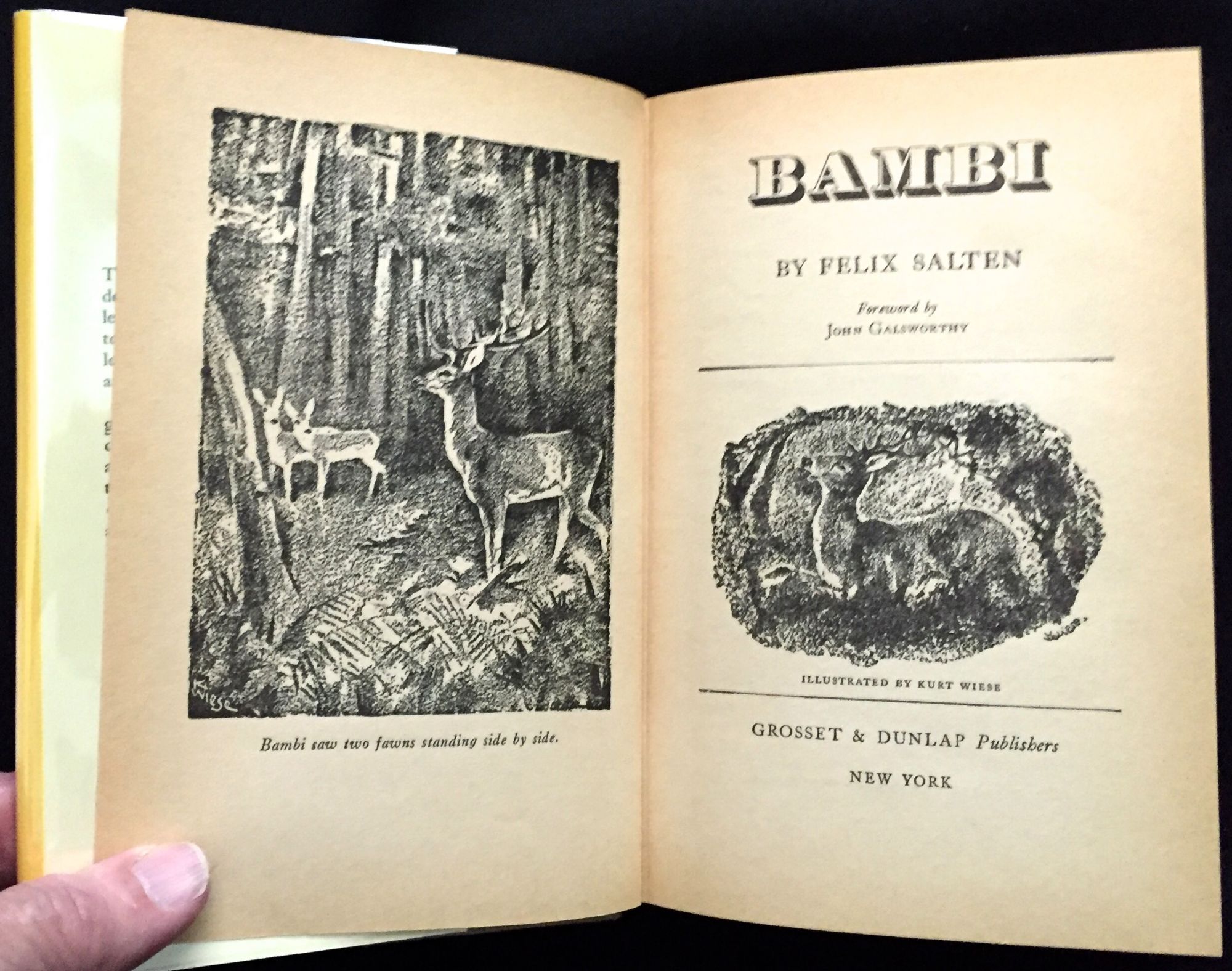p. 20 (I started pretty early with the notes in this book) "These were the earliest days of Bambi's life. He walked behind his mother on a narrow track that ran through the midst of the bushes. How pleasant it was to walk there." The melancholy, wistful tone is established right at the beginning. The English translation by the way was done by Whittaker Chambers, who was a name of some renown in his lifetime, though I don't have a good sense of what specifically he was renowned for.
p. 56 "In a moment Bambi darted after her. Gobo followed him. They flew around in a semi-circle, they turned tail and fell over each other. Then they chased each other up and down. It was glorious."
p. 59 "And Bambi's mother said to him, 'Come, it's time to go.' 'Wait just a little longer,' Faline pleaded eagerly, 'just a little while.' 'Let's stay a little longer, please,' Bambi pleaded, 'it's so nice.' And Gobo repeated timidly, 'It's so nice, just a little longer.'"
See what I mean.
Around this point I made a rather snide note that if a marginalized culture had produced this story, it would probably be held up as so subtly profound and wise as to be inaccessible to us.
pp.70-73 "'It was a bad business', he said, 'a monstrous uproar! You wouldn't believe how scared I was. I hunch myself up as still as a mouse in the corner and hardly dared move. That's the worst of it, having to sit there and move. And all the time you're hoping nothing will happen." This is a squirrel talking. I thought this passage might have been related to the Jewish experience in Europe.
Fall comes for the first time and Chapter VIII is a brief aside featuring the last couple of brown leaves clinging to a branch in complete denial about their future prospects, a real meditation on the reality of death. It hit home with me.
p. 234 I don't know what happened in the middle of the book, I meant to write down some notes but never got around to it. By this time Bambi has come to the point in life where I seem to be: "For his thoughts had grown serious and his heart heavy. He did not know what was happening within him. He did not even think about it. He merely recalled things aimlessly, and his whole life seemed to have become darker."
p. 258 Then he suffers injury and illness: "Not until the fever had entirely left his body did Bambi begin to think over all that had happened to him. Then a great terror awoke in him, and a profound tremor passed through his heart. He could not shake himself free of it. He could not get up and run about as before. He lay still and troubled." Obviously this whole passage would be lost on a child and would have to some extent been lost on the me of ten years ago. The depiction of the emotions of aging, not even out of youth, but really out of the prime years of life is eerily good. Salten, for the record, was 54 when Bambi was published, so he still had a few years on me. Books on these classics lists written by authors older than I am at the time of publication are not quite rare yet, but it has definitely reached the point where the circumstance is worth noting.
p. 268 "But of all his teachings this had been the most important; you must live alone, if you wanted to preserve yourself, if you understood existence, if you wanted to attain wisdom, you had to live alone."
Stolen picture. Since it's getting harder to do this, I'm going to have to start preparing more from my own materials. It shouldn't be hard.
The story meanders a little more in the second half, though it is obviously still an allegory. Though perhaps I should see it again, I think this aspect was completely lost in the Disney adaptation, which Salten apparently liked nonetheless.
I suppose I should at least briefly touch on the question of whether hunting is evil or not. Besides the brutality of humans which are duly noted, many of the animals are obviously predators too. After a heartwarming description of a family of ducks, a fox drags the mother duck out of the water and devours her, the mice live as virtually universal prey, and so forth. While death and inter-species violence are endemic to life, I think Salten would not have us find them lovable or heroic aspects of existence. He has chosen as his hero-animals the deer, who do not attack other animals, after all. I have, of course, never been on a hunt of any kind, unless we count setting mousetraps, the bringing of which latter death I must confess I have never lost any sleep over. I do not avoid hunting for any ideological reason, but merely because I did not grow up among people who ever did those sorts of things. It is a skill, and historically an important one for humans, especially male humans, to have, and I don't have any strong feeling that it was a skill that would better have remained undeveloped, so I have no urge to denounce it. Even the desire to virtue signal in me at this point is not powerful enough to give me any real pause in considering a position.
The edition of the book I read I found some years back in my attic (two copies of it in fact) in one of the many boxes of books that had been left up there for many decades by my wife's family. The book was published by Noble and Noble, with a brief forward by John Galsworthy and illustrations by Kurt Wiese. It looks like it dates from the World War II era, since there is an announcement on the copyright page declaring the book to have been made in strict conformity with WPB regulations of essential materials. It is a nice little book, though unfortunately I got something on my hands one day while I was reading it and smudged the cover.
The Bourgeois Surrender Challenge
1. Chicken Soup For the Cat Lover's Soul.......................................2,055
2. Philip Pullman--The Subtle Knife...................................................718
3. Jane Yolen--Owl Moon...................................................................268
4. Emile Zola--Germinal.....................................................................158
5. Bob Grant--Bambi (Golden Book)..................................................134
6. Kenneth Oppel--This Dark Engineer................................................84
7. Mary Eberstadt--It's Dangerous to Believe.......................................57
8. Victor Hugo--The Man Who Laughs.................................................37
9. Pippa Mattinson--Total Recall...........................................................28
10. Victor Digenti--Windrusher............................................................21
11. Velda Brotherton--Once There Were Sad Songs............................21
12. Maxim Gorky--Mother....................................................................20
13. Felix Salten--Bambi's Children........................................................13
14. Susanne Davis--The Appointed Hour................................................7
15. David Zindell--Splendor....................................................................5
16. Jana Richard--Lies and Solace...........................................................5
First Round
#16 Richard over #1 Chicken Soup
This is a pretty excruciating matchup.
#2 Pullman over #15 Zindell
In battles of two genre books, I am going to go chalk until the final four from now on.
#3 Yolen over #14 Davis
The Yolen book is a children's book but it did win the Caldecott medal
#4 Zola over #13 Salten
A rare clash of IWE authors in the Challenge. I am actually curious about the Bambi sequel, but it wasn't enough for me to give it a win here.
#5 Grant over #12 Gorky
Upset card played over another IWE stalwart.
#6 Oppel over #11 Brotherton
#10 Digenti over #7 Eberstadt
Eberstadt's book is about religion and contemporary issues, not a genre novel. Unfortunately Digenti has an upset card.
#8 Hugo over #9 Mattinson
No one really studies like this anymore, but at least someone else wishes they did.
Elite Eight
#2 Pullman over #16 Richard
#3 Yolen over #10 Digenti
#4 Zola over #8 Hugo
Another clash of titans
#6 Oppel over #5 Grant
Oppel uses up his upset card.
Final Four
#2 Pullman over #6 Oppel
#4 Zola over #3 Yolen
Champiuonship
#2 Pullman over #4 Zola
Pullman had a upset coming that he didn't have to use until the final. His books certainly appear to be popular. I have no idea what they are about.
This is that Philip Pullman guy.





No comments:
Post a Comment